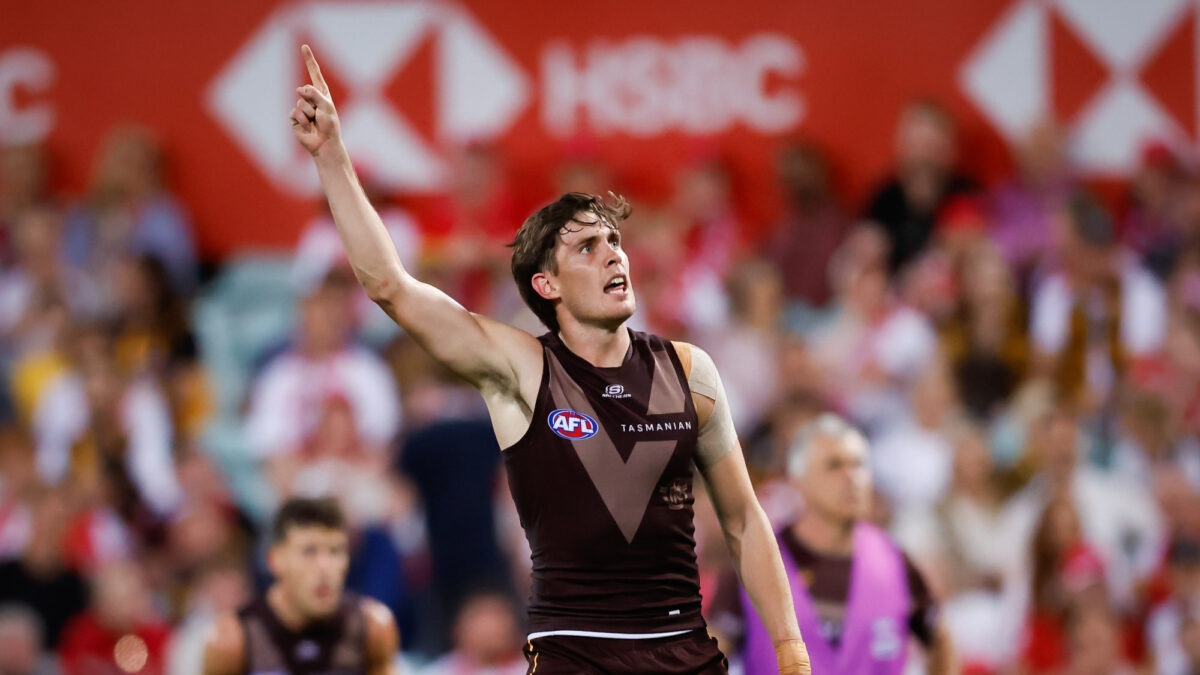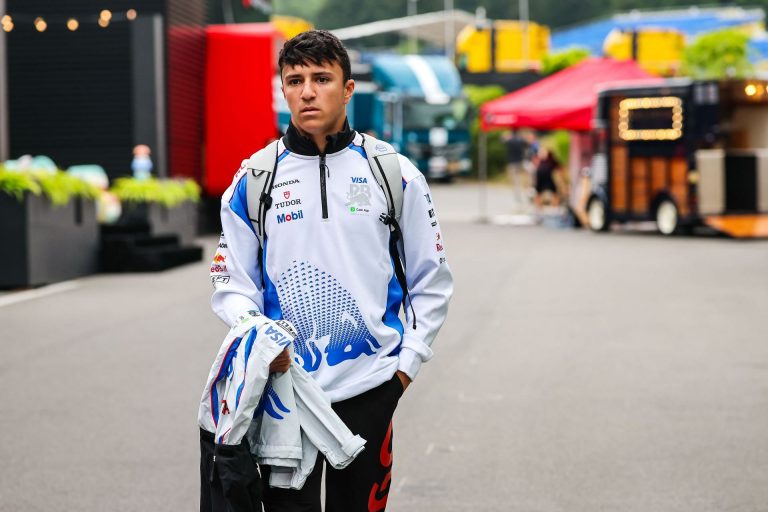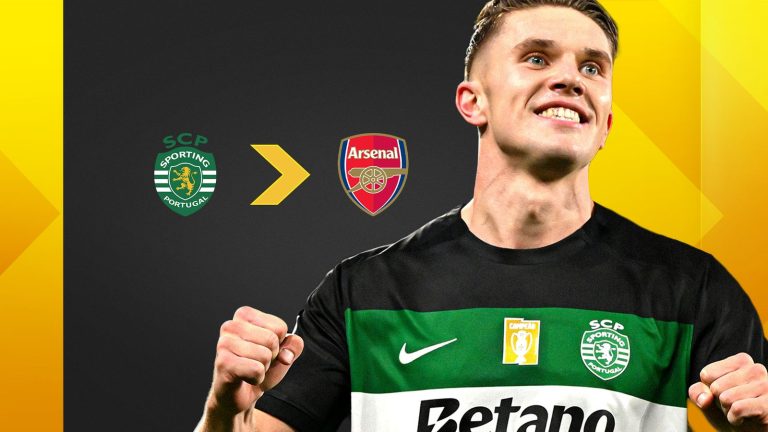For three quarters on Friday night – and in particular up until quarter time – Hawthorn and Sydney were nothing short of brilliant.
In a contest that ebbed and flowed from end to end with dashing, daring runs and dazzling skills, both sides unencumbered by opposition pressure that carried with it plenty of off-season rust still, two of this year’s flag favourites proved every inch of that moniker.
The difference in the end was, the tougher the game got, the higher the intensity and the worse the weather, the Hawks had an extra string to their bow.
They were, to put it simply, tougher.
Tougher at the hard ball, led by the brilliant Will Day and a midfield that outhunted, out-tackled and outwilled a Swans on-ball brigade featuring two modern greats in Isaac Heeney and Chad Warner and impressive depth to boot.
More ferocious in their tackling, perhaps best summed up by a lunging Connor Macdonald chasedown on Nick Blakey in the second quarter that forced an errant kick, sparked a turnover, and led to a chance to score.
And more willing to put their heads over the footy when the heavens opened and the game became a scrap in the last quarter – attested to by a series of high contact or in the back free kicks caused by Swans opponents arriving second to the ball.
For all Hawthorn achieved in a remarkable surge up the ladder in 2024, the toughness of this team still goes underrated – and of course it does, when you have Nick Watson kicking dazzling goals, Jack Ginnivan celebrating everything with gusto and a side characterised by game-breaking dash down the ground and more speed than any other in the league.
But on Friday, Nick Watson was barely sighted, clamped devastatingly by Sam Wicks in a new role as nagging small back. Josh Weddle too was well down, the pacy line-breaking Hawk restricted to just 122 metres gained and 12 disposals as the Swans refused to let him become a Nick Blakey-esque menace. James Worpel was injured at half time; Connor McDonald seldom influential with ball in hand.
And the Hawks won anyway.
That ‘Hokball’ stereotype does them a little bit of a disservice. This is a team that, right now, lacks for just about nothing, be it personnel or style. Sydney won’t be the last team this year to match them in plenty of aspects but fall short across the board.
Structurally, the Hawks have all bases covered, with their newfound defensive strength enabling Sam Mitchell to make a decisive last-quarter move without compromising behind the ball.
With 21-6 intercept marks, the Hawks ruled the skies down back at the SCG, giving the Swans minimal opportunities to mark or even bring the ball to ground in attack.
Naturally, the arrival of Tom Barrass and Josh Battle was chiefly responsible, though Barrass was tested by a quality opponent in Joel Amartey who made the most of his chances to slot three goals.
But Jack Scrimshaw was brilliant as well; his subtle transition down back from running link player to a real backline lynchpin, using his height in defence to his advantage despite a lighter frame, has been a core ingredient to Hawthorn’s success in the last 12 months.
A decisive, symbolic moment in the final quarter was a strong Scrimshaw mark in the wet at half-forward, surrounded by a sea of Swans; if that ball comes to ground, Sydney are ideally placed to attack and try and catch the Hawks on the counter. Instead, they needed to once again batten down the hatches to prevent the Hawks from scoring.
It means Sicily can now be footy’s first true swingman since the late Adam Hunter played X-factor for West Coast in their 2006 premiership run.
Marshalling the defence as always in the first three quarters – this time as a third tall rather than needing to take one of the monsters – Sam Frost’s substitution at half time was always going to eventually see the captain go forward.
Dangerous in the air, he took a strong grab at half-forward only to fail to make the distance, while his goal from a final-quarter free kick was a classic case of a defender panicking against a quality opponent and making a mistake.
But the true measure of the Hawks’ Friday night triumph came at the coalface, a long-time Swans weakness; they smashed the clearances 47-33, had 12 extra contested possessions, and even without Worpel after half time made the Bloods bleed out of the centre.

Will Day celebrates a goal. (Photo by Dylan Burns/AFL Photos via Getty Images)
Day was the centrepiece to everything, especially up to half time, and is another example of a surface judgement not doing the Hawks justice.
Day is meant to be the silky-smooth counterpoint to the bullish balls of muscle around stoppages that are Newcombe and Worpel; him missing the finals through injury last year was a blow, but one the Hawks were able to cover, I thought.
Now, I’m thinking if they had him for September they might have won the flag. This is an enormously well-balanced on-baller who, like his team, is much more than just razzle-dazzle.
Day wins his own ball, does the tough stuff, and then reminds me a lot of Scott Pendlebury in the way he creates space without being overly speedy or eye-catching. He’s a proper death by a thousand cuts guy… provided he doesn’t, as he did in one half against Sydney, dominate to the extent that he had three goals to his name.
Such was his influence that James Jordon, Sydney’s go-to tagger, had to run with him after half time, slowing Day’s dominance but changing the midfield dynamic, and providing a psychological victory. John Longmire’s Swans resisted Jordon tagging on-ballers wherever possible, preferring instead to use him on the opposition’s best running defender and let Heeney, Warner and the rest operate on their own terms in midfield.
If it was the point of the exercise, every Hawk would merit praise for their role in the system.
Lloyd Meek is superbly suited to modern ruckwork, as a strong-bodied big man who matched Brodie Grundy in the influence of his taps, while running rings around him elsewhere with his big contested marking, aerial presence, ground-level follow-up and pair of goals; Harry Morrison bobbed up at key moments and used the ball immaculately forr someone whose biggest query was once his disposal; Karl Amon was again ultra-important providing run and drive from defence and produced the clearr Hokball highlight of the evening.
But the truth of the matter is that it would be impossible to name everything the Hawks do well, and everyone that influences that system.
This is an outstanding team with an outstanding coach at the helm, and teams are going to have to work out how to stop them – because as Sydney learned on Friday, beating them at their own game is bloody tough.
I had the Hawks stagnating this year in my pre-season prediction. I might have to rethink that.






